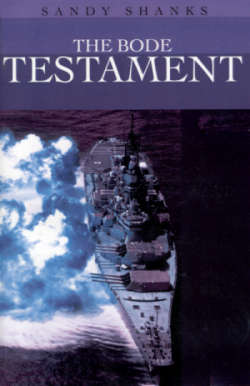
The Bode Testament
Read an Interview with the Author
Sandy Shanks has written a book about one of the Navy's blackest days. At the Battle of Savo Island, on August 9th, 1942, the U.S. Navy lost three heavy cruisers, with a fourth heavily damaged. The Captain of that cruiser, Howard D. Bode, was subsequently censured for his performance in the battle. He never again commanded a ship, and committed suicide in April 1943.
This simple story is the basis for Shanks' exploration. He is careful to admit that he is writing fiction, and this reviewer right here gives him credit for making clear, in most cases, where historical fact is garnered with fictional plot and discussion. This reviewer is not actually a friend of historical fiction, so some bias may show in this review.
Shanks starts off his book with a description of the Battle of Savo Island, first by setting the stage, then by introducing Captain Bode and his actions. He traces Bode's actions and shows the difficult situation Bode faces. But the description of the battle is only by way of introduction to the real subject, and Shanks devotes but the first seven chapters (of thirty-one) to the engagement and the developments before it. Shanks lets Bode visit Admiral Crutchley, his immediate superior, to make his case for the first time: Bode states all the reasons why he behaved the way he did. But, we find soon thereafter, all the Navy has in store for him is a dismissal from command of Chicago, his ship, and reassignment to Balboa Naval Base. There, he receives a call to speak to Admiral Hepburn, for a report on the action. Hepburn's report, once completed, finds fault with Bode's behaviour, and only Bode's - completely unable to take that shock, Bode decides to commit suicide.
The real Bode managed - but in Sandy Shanks' story Bode does not manage. He shoots himself through the cheek, is found on time and wakes up with his wife by his side. It is his wife that suggests he should sue the Navy; and off we go on to the main pursuit of the book: showing the fictional trial in which Bode seeks to redress the unfair verdict of the Hepburn Report.
As we follow the description of the trial, the feeling is that Shanks nows of what he speaks - so he is either a lawyer himself or a good learner, to have grasped the technicalities of the law process so convincingly. Perhaps the fact that the reviewer himself is a layman and is perhaps easily convinced helps; but Shanks does a great job of introducing a realistic court scene, which nonetheless does not turn the book into a dry affair. The characters of the men on both sides, the judge, and the various witnesses called are vivid and interesting. The idea of putting on the witness stand men only known from history books - Admirals, Generals, and various other military men, and Bode himself.
At the end of it all stands the verdict. What verdict that is, I will not tell you, for this book is quite worth reading and finding out for oneself.
What are the problems this book has? It would be foolish to presume that a book as big as this, and being the author's first work, is free of some oversight. Some may be accepted as fiction's approach to things, were minor historical things are not worth too much trouble of explanation - such may account for the wrong attribution of jobs to Admirals King and Nimitz at the time of the presumed trial in early 1946, when Nimitz was no longer, as Shanks introduces him, Commander-in-Chief Pacific Fleet, and King no longer CNO. Other bits were found by this reviewer to be somewhat at the edge of credibility, like a phone call Admiral King makes to Bode for the simple purpose of calling him names; or the calling as a witness of Admiral McCain, who was dead by the time the trial would have taken place. Another problem may be more serious, the repitition of Captain Bode's story of the battle and his defense, which we hear several times; realistically, of course: for Bode would have repeated the same things before Hepburn, then before his wife, before his attorney and then again before the court. But this reviewer, at least, found it necessary to skip the final time, taking the risk of missing something over the repeated re-reading.
But let that not distract you from the fact that this is a very good book. Anyone who is interested in the Battle of Savo Island, or who delights in reading a good court-room story, will greatly enjoy reading this book.
Reviewed by Tim Lanzendoerfer
by Sanford H. Shanks
New York: Writer's Club Press, 2001
Preface, Acknowledgements, Author's Notes, Annex, Bibliography, End Notes
532 pages